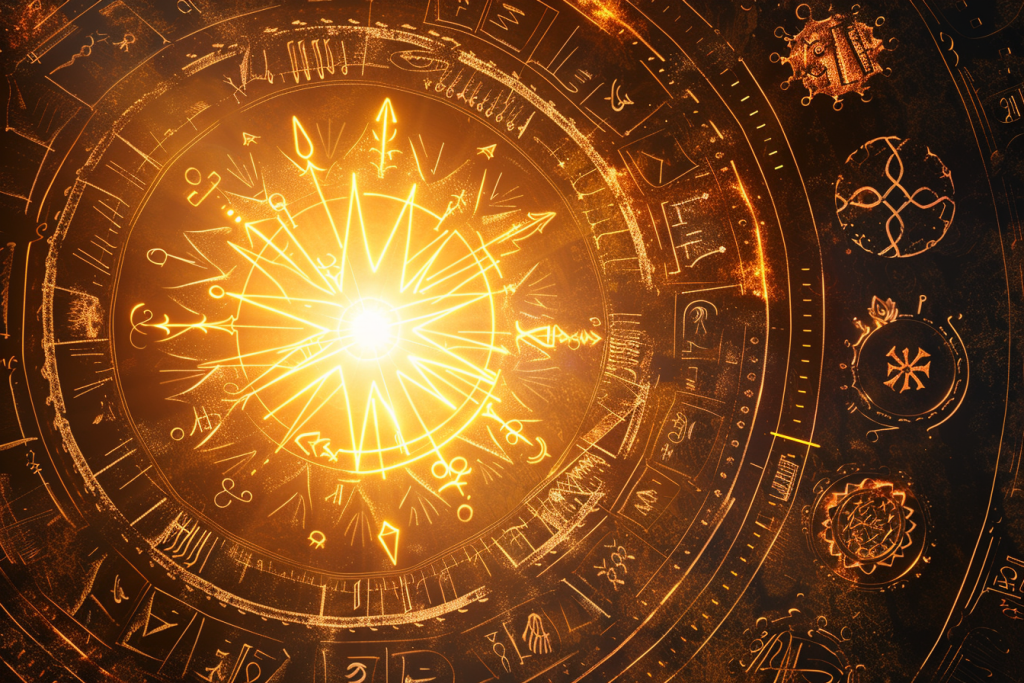Wisdom of the Ages
The Timeless Quest for Knowledge and Understanding
In the digital era, where the latest tweet feels like ancient history after just 24 hours, there’s something profoundly grounding about diving into the ancient wisdom teachings. It’s like realizing your great-great-great-grandparents were onto something long before the internet came along to tell us how to live our lives. This quest for knowledge isn’t a new fad—it’s as old as humanity itself. People have always been seekers, looking for answers to life’s big questions. Why are we here? How should we live? Can someone please figure out how to program the DVR?
Bridging Ancient Wisdom with Modern Insights
Mixing ancient wisdom teachings with modern philosophy trends is not unlike blending a vintage wine with a new, zesty flavor—it can be a hit or miss, but when it’s done right, it’s magic. This blend helps us see that spiritual enlightenment paths aren’t just about sitting under a tree and waiting for enlightenment to hit us on the head. It’s about the journey, filled with mindfulness meditation techniques and occasionally tripping over our own feet.
Stoic exercises for resilience introduce us to the art of not sweating the small stuff (because, let’s face it, it’s almost all small stuff). Meanwhile, Eastern vs. Western philosophy debates remind us that the world is big enough for multiple truths. And for those who like their spirituality with a side of mystery, Sufi mystical practices and archetypal psychology insights offer paths to deeper understanding that don’t always need to be explained to be appreciated.
In this fusion, ethical living principles aren’t outdated codes of conduct but fresh, relevant guides for making the world a better place. After all, who doesn’t want to leave the campsite cleaner than they found it? And as we weave through cross-cultural spiritual beliefs, we find that our differences aren’t wedges but bridges, linking us in ways we’d never imagined.
Eastern Philosophies: Foundations of Spiritual Wisdom
In the vast universe of spiritual wisdom, Eastern philosophies shine like timeless beacons, guiding seekers towards enlightenment and balanced living. These ancient wisdom teachings, with their rich world of insights and practices, continue to influence both modern philosophy trends and spiritual enlightenment paths.
Exploring the Core Teachings of Buddhism
The Four Noble Truths and the Path to Enlightenment
Buddhism stands out for its profound understanding of human suffering and the roadmap it offers for attaining liberation from it. At the heart of Buddhism are the Four Noble Truths, which, in a nutshell, teach that life comes with suffering, there’s a cause for this suffering, there’s also an end to it, and finally, there’s a path that leads to the cessation of all pain. This path, known as the Eightfold Path, encompasses everything from right understanding and right action to mindfulness meditation techniques, demonstrating how ethical living principles and mental discipline can lead to spiritual enlightenment.
Engaging in mindfulness meditation is not just about becoming a Zen master; it’s about finding calm in the chaos and clarity in the confusion. For those looking to dive deeper into this practice, numerous resources are available online, including the ever-insightful Mindful.org, which offers tips and guidance on how to incorporate mindfulness into daily life.
The Philosophical Richness of Taoism
Understanding the Tao and the Virtue of Wu Wei
Taoism, another gem in the crown of Eastern philosophy, invites us into the flow of the universe through the concept of the Tao. This philosophy emphasizes living in harmony with the natural order of things, or what is known as the Tao, and teaches the virtue of wu wei, or “effortless action.” This principle encourages individuals to act following the flow of life, making it a cornerstone of both Stoic exercises for resilience and ethical living. Taoism champions simplicity, spontaneity, and a deep connection with nature, reflecting a unique blend of archetypal psychology insights and cross-cultural spiritual beliefs.
The Influence of Hinduism on Spiritual Practices
Concepts of Karma, Dharma, and Moksha
Hinduism, with its kaleidoscopic perspective on the divine and the mundane, introduces concepts like karma (action and its consequences), dharma (righteous duty), and moksha (liberation from the cycle of birth and rebirth). These principles guide individuals on their spiritual paths, influencing not just personal ethical living but also social and cosmic harmony. Hinduism’s spiritual practices, including various forms of yoga and meditation, aim to foster a connection with the divine, leading to comprehensive personal transformation and enlightenment.
For those keen on exploring yoga as a pathway to spiritual growth, Yoga Journal offers resources, from beginner to advanced levels, showcasing how this ancient practice remains relevant in modern times.
Each strand of Eastern philosophy – Buddhism, Taoism, and Hinduism – offers unique practices like mindfulness meditation, principles of wu wei, and the pursuit of dharma, crafting a rich mosaic of avenues for spiritual exploration. These traditions invite individuals to begin on a journey within, to discover timeless truths and the essence of being, proving that ancient wisdom teachings remain not only relevant but essential in today’s world.
Stoicism: The Ancient Art of Living
The Principles of Stoic Philosophy
Embracing Virtue, Wisdom, and Emotional Resilience
Stoicism, an ancient philosophical powerhouse, has been making a grand resurgence, proving that ancient wisdom teachings are anything but outdated. At its core, Stoicism is about getting a grip on what we can control and letting go of what we can’t. It’s like being the director of your own mental peace, choosing virtue, wisdom, and emotional resilience as your top actors. You don’t control the weather, but you sure can control how you react to a downpour.
The Stoics are the original cool cucumbers, schooling us on how to maintain our chill no matter what life throws our way. They’re all about embracing ethical living principles and making the best out of a bad situation by focusing on self-improvement and resilience. Imagine a mental toolbox; Stoicism stocks it with mindfulness meditation techniques and an attitude of gratitude. It’s not about denying feelings but rather not letting them run the show.
Stoicism in Modern Life
Practical Stoic Exercises for Contemporary Challenges
Fast forward a couple of millennia and Stoicism is still as relevant, maybe even more so. Why? Because modern life is full of rapid changes, overwhelming choices, and frankly, a lot of stress. Injecting a dose of Stoic wisdom into the mix can be like finding an oasis in a desert.
One does not simply walk into Mordor, nor does one simply become Stoic overnight. It takes practice. Enter Stoic exercises for resilience. These practices are ancient gym routines for the mind. One popular technique is the morning reflection, where you visualize the challenges you might face during the day and prep yourself mentally. Think of it as your morning shot of espresso, but for your soul.
Another gem from the Stoic toolkit is the evening review. Before you hit the hay, reflect on your day. What went well? What could’ve been better? It’s not about self-flagellation but about self-improvement. It’s acknowledging the mess-ups without letting them define you.
Then there’s the view from above, a mental zoom out, if you will, reminding us how small our problems are in the grand scheme of things. It’s like Google Earth for your life views, providing perspective that what we fret over might not be as monumental as it seems.
For those interested in diving deeper into Stoicism and modern philosophy trends, websites like the Daily Stoic (daily stoic) offer bite-sized, actionable insights. Meanwhile, exploring how Eastern and Western philosophies blend, especially in today’s spiritual enlightenment paths, can give broader perspectives on life’s big questions. Another great resource is the Stanford Encyclopedia of Philosophy’s entry on Stoicism, providing a deeper academic jump into its principles (Stanford Encyclopedia of Philosophy).
Stoicism isn’t about becoming emotionless robots; it’s about harnessing our emotions to lead happier, more meaningful lives. As we navigate the complexities of modern existence, from cross-cultural spiritual beliefs to Sufi mystical practices, incorporating stoic wisdom provides a solid foundation to face whatever life throws our way, with a shrug and a wise smile.
Modern Thought Leaders: Shaping the Present
Diving into the area of spiritual and philosophical musings doesn’t have to be like deciphering ancient hieroglyphics. Today’s thought leaders are making waves, blending the deep, timeless river of ancient wisdom teachings with our rapid digital world. They’re kinda like the cool teachers who could discuss both Aristotle and artificial intelligence over a cup of coffee.
Insights from Contemporary Philosophers and Spiritual Teachers
Bridging Science and Spirituality for Personal Growth
Modern philosophy trends are all about taking the old-school cool—think Eastern vs. Western philosophy—and mixing it with the latest in neuroscience. It’s as if your brain went on a yoga retreat and came back sporting quantum physics tattoos. These contemporary sages are proving that you can meditate your way to better mental health while also understanding the brain science behind your ZEN moments. Creative, right? They’re the bridge over troubled waters, showing that mindfulness meditation techniques aren’t just spiritual fluff but backed by hard science.
Stoic exercises for resilience and Sufi mystical practices may sound like they belong in history books, but they’re being revived and revamped for today’s challenges. These practices offer concrete strategies for handling the curveballs life throws, from work stress to existential angst, proving that some ancient advice is pretty timeless.
The Impact of Technology on Spiritual Practices
Exploring Digital Meditation and Virtual Mindfulness
The digital age has transformed our lives in countless ways, but who knew it could give spiritual enlightenment paths a high-speed upgrade? Gone are the days of trekking to a mountaintop for wisdom (unless you’re into that sort of thing). Now, mindfulness meditation techniques are just a click away, offering peace of mind without leaving your couch.
Virtual platforms are making meditation and mindfulness accessible to anyone with an internet connection. It’s a game-changer for those who thought they were too busy to breathe. From apps that guide you through meditation sessions to online communities where you can discuss archetypal psychology insights and ethical living principles, technology is proving to be a powerful ally on the quest for inner peace.
What’s even cooler is that through forums, podcasts, and webinars, we’re witnessing the merging of cross-cultural spiritual beliefs. This digital age enables a melting pot of ideas, offering a richer taste of spiritual practices than ever before. Imagine swapping mindfulness techniques with someone halfway across the globe or tuning into a lecture on modern philosophy trends during your morning commute.
In the end, the message is clear: spiritual wisdom isn’t stuck in the past. It’s alive, kicking, and evolving right here, right now, with a little help from some modern thought leaders who are making sure these ancient wisdom teachings and spiritual enlightenment paths are speaking our language, no matter how much tech we’ve got in our hands.
Wisdom from World Religions
Jump into the fountain of knowledge that’s been quenching the spiritual thirst of humanity for eons. Talking about ancient wisdom teachings meshed with modern philosophy trends? You’ve hit the spiritual jackpot. Let’s untangle this cosmic web of beliefs and see what gems we can find.
The Moral Teachings of Christianity
Lessons in Love, Forgiveness, and Redemption
Christianity isn’t just about singing hymns and trying not to snooze through sermons. It’s jam-packed with lessons on love, forgiveness, and grabbing that second chance with both hands. Think of it as the ultimate guide to not being a jerk and making the world a slightly better place, one kind act at a time. Stoic exercises for resilience? Christianity’s got them in spades. From turning the other cheek to loving thy neighbor, it’s about finding strength and serenity in the chaos of daily life. And who couldn’t use a bit more of that?
The Mystical Traditions of Islam: Sufism
The Pursuit of Divine Love and Unity
Switch gears to Sufism – Islam’s mystic spin-off that’s all about diving deep into the ocean of spiritual enlightenment paths. If you thought middle eastern wisdom was all harsh deserts and strict rules, Sufism’s here to flip the script. It’s about seeking unity with the divine through love – think Rumi’s poetry, with its heart-wrenching verses on divine love and transcending the ego. They’re not just about getting lost in love; they’re road maps to the soul, guiding followers toward a union with the divine.
Sufism showcases some serious mindfulness meditation techniques and ethical living principles that are as relevant today as they were a thousand years ago. Looking for a crash course in finding inner peace and connecting with something greater? Sufism’s mystical practices have you covered.
Ancient wisdom teachings? Check. Spiritual enlightenment paths? Double-check. Whether it’s the redemptive power of Christian morals or the soul-stirring mysticism of Sufism, there’s a universe of wisdom waiting to be discovered. These age-old traditions offer a compelling take on ethical living principles and the pursuit of spiritual fulfillment, serving as a beacon for seekers exploring the choppy waters of modern life.
For more on mindfulness and meditation techniques that can help foster resilience and promote a deeper connection with oneself, the American Psychological Association offers resources and insights into how these practices benefit mental health. Also, those intrigued by the poetic expressions of divine love in Sufism can investigate into Rumi’s works further through the Rumi Network, bringing ancient teachings into a contemporary context.
The Role of Mythology in Understanding Life
Mythology isn’t just a collection of old stories gathering dust on the shelves of history. It’s a vibrant, pulsating guide to understanding life with lessons that echo through time. From the intricate webs of Greek myths to the raw, powerful narratives of Norse mythology, these ancient tales shed light on the human condition, offering ancient wisdom teachings and archetypal psychology insights often mirrored in modern philosophy trends.
Learning From Greek Myths
Heroes’ Journeys and Archetypal Wisdom
Greek myths are more than just tales of gods throwing lightning bolts and turning mortals into flowers. They are deeply embedded with lessons on spiritual enlightenment paths and stoic exercises for resilience. The hero’s journey, a common thread in these myths, isn’t just a template for epic movies; it’s a blueprint for personal growth. Characters like Hercules and Odysseus don’t just fight monsters—they battle internal conflicts, learn from their missteps, and emerge wiser, reflecting the ethical living principles one can apply today. These stories, ripe with archetypal psychology insights, help us navigate our own lives with a bit more grace and a touch less drama.
The Symbolic Narratives of Norse Mythology
Valuing Courage, Honor, and Fate
Norse mythology brings us face to face with a raw, untamed understanding of life. It’s a world where gods and mortals alike value courage, honor, and the inevitable embrace of fate. These narratives don’t just entertain; they serve as a stark reminder of the stoic virtues of resilience and integrity. The tales of Thor’s hammer throws and Odin’s quest for wisdom aren’t merely for amusement—they’re lessons on the importance of mindfulness meditation techniques and the stoic exercises for resilience in the face of an often unpredictable world.
Norse and Greek myths, with their deep roots in ancient wisdom teachings, continue to provide a rich soil for spiritual enlightenment paths. As we navigate modern philosophy trends, there’s a lot we can learn from these cross-cultural spiritual beliefs about ethical living principles and the pursuit of a meaningful life. In embracing the Sufi mystical practices or exploring Eastern vs. Western philosophy, it’s evident that the wisdom of the ancients still has much to offer in our quest for personal and spiritual growth.
By intertwining the mindfulness meditation techniques advocated in Sufism with the stoic exercises for resilience found in Greek and Norse myths, individuals today find a comprehensive toolkit for exploring the complexities of modern life. This blend of ancient wisdom teachings and modern philosophy trends, examined through the lens of archetypal stories, highlights the timeless value of mythology in understanding life’s intricate mysteries.
Integrating Ancient Wisdom into Modern Existence
Balancing Material Pursuits with Spiritual Fulfillment
Finding Harmony in Today’s World
In the hustle and bustle of today’s rapid society, finding a balance between chasing the almighty dollar and nurturing the soul can feel like trying to find a Wi-Fi signal in the middle of the Sahara—frustrating and seemingly futile. Yet, this quest for equilibrium is nothing new. Ancient wisdom teachings and modern philosophy trends are like the peanut butter and jelly of personal development—they’re better together.
The key is in pairing the pursuit of material success with a commitment to spiritual growth. Think Steve Jobs meets Rumi. Jobs famously blended Eastern vs. Western philosophy to fuel both his technological innovations and his personal life. Similarly, individuals can draw upon the ethical living principles of ancient texts, like the Bhagavad Gita or Tao Te Ching, while exploring today’s digital world. Such an approach ensures that one’s achievements are not just measured by the size of their bank account but also by the depth of their happiness and sense of inner peace.
The Practice of Mindfulness and Presence
Techniques for Cultivating Awareness and Inner Peace
Mindfulness might sound like the latest buzzword on the wellness scene, but it’s as old as the hills. This ancient practice, deeply rooted in Buddhism and later adopted by other spiritual traditions such as Sufi mystical practices, is all about living in the now. It’s like giving your brain a spa day, every day.
For those seeking to dip their toes into the tranquil waters of mindfulness, mindfulness meditation techniques are a good starting point. These practices aren’t just for the spiritually enlightened or those with too much time on their hands. Busy bees can benefit too. Just five minutes of mindfulness a day can help reduce stress, improve focus, and boost creativity. Interested in learning more? Headspace offers a great introduction to mindfulness for beginners.
Also, integrating stoic exercises for resilience into daily routines can offer a sturdy shield against life’s arrows. The stoics knew a thing or two about roughing it out without losing their cool. By adopting some of their strategies, like focusing only on what one can control, individuals can cultivate a sense of calm in the chaos of modern life.
In weaving the thread of ancient wisdom teachings into the fabric of current existences, individuals find a richer world of life. It’s about marrying the best of both worlds—the time-honored with the cutting-edge. This blend not only enhances personal development but also promotes a deeper understanding and respect for cross-cultural spiritual beliefs.
In the area of personal growth, archetypal psychology insights offer another layer of depth. By exploring the common patterns and themes in human behavior that transcend cultural boundaries, individuals can gain a better understanding of themselves and their place in the world. Carl Jung’s work, accessible on platforms like the Jung Society, provides a treasure trove of knowledge on exploring life’s challenges through the lens of archetypal wisdom.
By integrating these timeless principles into daily life, individuals forge a path that leads not only to external success but to profound inner fulfillment. This journey, infused with a diversity of spiritual enlightenment paths and practices, is emblematic of the rich, multifaceted experience of human existence.
Carrying Forward the Wisdom of the Ages
The Eternal Relevance of Age-Old Insights
In today’s fast-track life, where swiping left is a decision-making skill, ancient wisdom teachings might sound as outdated as the flip phone. But, they’ve survived the test of time for a reason. They’re like the grandma’s advice that you roll your eyes at but secretly know is pure gold. From the spiritual enlightenment paths carved by Eastern and Western philosophy to the mindfulness meditation techniques that have weaved their way through centuries, these pearls of wisdom are more relevant today than ever.
Applying Ancient Wisdom in the Pursuit of Meaning and Well-being
Let’s break it down. First up, modern philosophy trends often echo the musings of Plato or Confucius, proving that great minds think alike across millennia. Pair that with stoic exercises for resilience and you’ve got a recipe for tackling life’s curveballs like a pro. Think of it as mental gymnastics, only instead of a flashy leotard, you’re armed with the sage advice of Marcus Aurelius.
Dabbling in mindfulness meditation techniques isn’t just for the Zen crowd. It’s about finding a slice of peace in the chaos, a moment of “me time” amid the endless notifications. The practice has roots in Buddhism and Sufi mystical practices, but it’s been rebranded for your daily grind.
Eastern vs. Western philosophy might sound like an intellectual UFC match, but it’s actually about balance. While Western thought often zeroes in on the individual, the Eastern perspective brings a communal harmony to the table. It’s like choosing between pizza and sushi – both amazing, but bringing different flavors to your life palette.
Exploring life with archetypal psychology insights can unravel personal mysteries in ways that would make Sherlock Holmes take notes. Carl Jung’s concepts don’t just sound cool; they offer a map to exploring the subconscious alleys we often overlook.
For those forging paths toward ethical living principles, ancient wisdom offers a compass. It’s about making choices that resonate with our core values, much like choosing the eco-friendly packaging or saying no to that extra plastic bag.
Frequently Asked Questions
How does modern philosophy align with ancient wisdom?
Modern philosophy trends often mirror or build upon the teachings of ancient philosophers like Plato and Confucius, incorporating practices such as stoic exercises and mindfulness meditation that have roots in Eastern and Western traditions.
What is the significance of stoic exercises and mindfulness meditation?
Stoic exercises and mindfulness meditation are significant for their proven benefits in promoting mental health, emotional resilience, and overall well-being, drawing from ancient wisdom as practical tools for contemporary life.
Can you explain the balance between Eastern and Western philosophies the article talks about?
The article explores how combining the insights and practices from both Eastern and Western philosophies can offer a more holistic approach to personal development and well-being, by taking the strengths from each perspective.
What role does Carl Jung’s archetypal psychology play according to the article?
According to the article, Carl Jung’s archetypal psychology provides valuable tools for self-discovery, helping individuals uncover deep-seated patterns and narratives that shape their behavior and life choices, aligned with ancient wisdom.
How does ancient wisdom guide ethical decision-making in the modern world?
The article suggests that ancient wisdom, with its emphasis on virtue and morality, can guide individuals in making ethical decisions, such as choosing eco-friendly options, by providing timeless principles that transcend modern dilemmas.
Why is it important to apply ancient wisdom to today’s challenges?
Applying ancient wisdom to today’s challenges is crucial for finding inner peace and navigating life’s complexities with a well-grounded and thoughtful approach, as it offers time-tested insights and practices for personal and communal well-being.
Our Latest Wisdom of the Ages Posts

Discover Spiritual Enlightenment Through the Ancient Practice of Yoga

Unlocking Norse Mythology: Lessons on Bravery and Fate for Modern Life

How Egyptian Mysticism Shapes Modern Spirituality: An Ongoing Legacy

Master the Art of Living: Insights from Ancient Roman Philosophers

Understanding Zen Buddhism’s Approach to Mindfulness: Techniques and Benefits Explained


